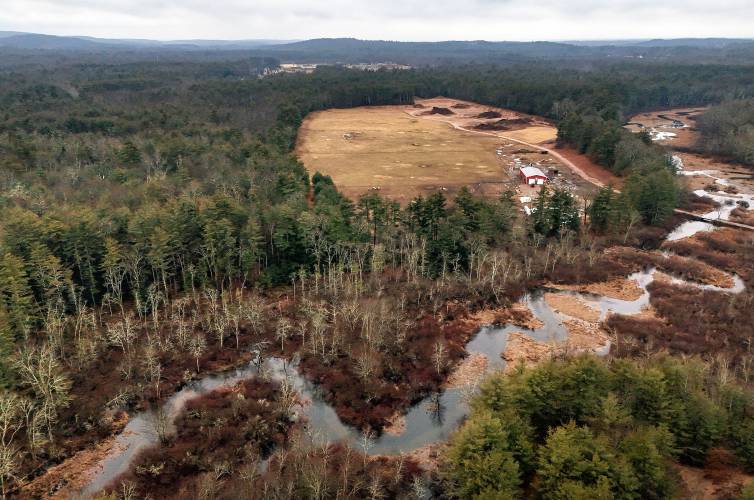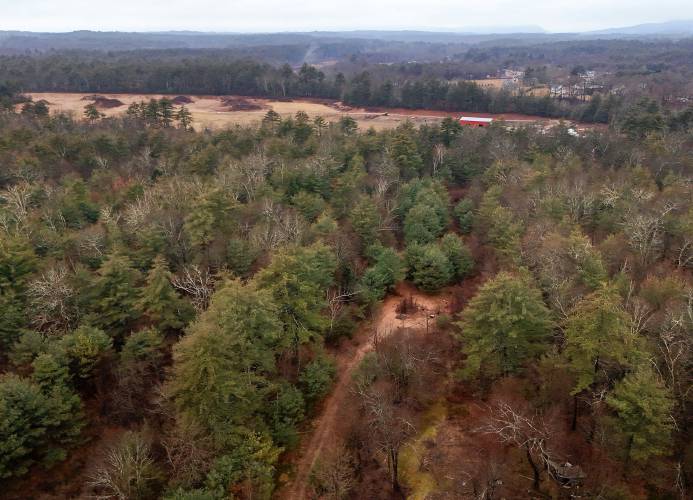For second time in 12 years, neighbors mobilize against proposed gravel pit operation in Granby
| Published: 02-29-2024 4:31 PM |
GRANBY — It’s deja vu for many residents who live in the northeast section of town, where plans have been submitted for the operation of a gravel pit, some 12 years after a group of neighbors successfully sued the town to thwart a similar proposal.
Efforts to open a pit off Trompke Avenue and Batchelor Street near Batchelor Brook failed in 2011 when 10 residents sued the Select Board for issuing a special permit granting Stony Hill Sand and Gravel Co. of Springfield the right to remove 40,000 cubic yards of gravel and sand yearly.
At that time, residents claimed the application failed to abide by traffic bylaws and environmental regulations for groundwater and wetlands. Although the Select Board added 22 conditions to the approval, the lawsuit said the board did not do its due diligence. The judge ruled for the residents, specifically about the traffic concerns of industrial trucks traveling the windy and hilly residential streets several times a day.
Over a decade later, a company out of Belchertown, LJ Development LLC, has applied for a special permit to remove the same amount of material from the same location on Trompke Avenue. And residents still have the same concerns.
More than 60 people turned out to urge the Select Board to deny a special permit for LJ Development’s gravel pit proposal during a packed public hearing at the Council on Aging building on Feb. 26.
Those who live near the proposed site raised concerns about possible damage to Batchelor Brook, which winds through the area, degradation of air quality, an increase in noise and vibration, negative impacts to groundwater, and added traffic on the windy, narrow roads where children and families reside.
“Trucks driving down Batchelor Street numerous times a day would not only cause costly damage to the roads themselves, but also threaten the lives of drivers, walkers, bikers, joggers, pets and the various fauna along the roadway,” Sarah Gerstenfield said, “not to mention the dust that threatens the lovely air quality we have here in Granby.”
LJ Development is a small Belchertown company managed by Neil Jackson and Jason Lafleur, according to records filed with the Secretary of the Commonwealth Corporations Division. Jackson and Lafleur could not be reached for comment, but in presenting the plans before the Select Board on Feb. 5, Lafleur said the sand and gravel near Trompke Avenue is well suited for the septic systems another company of his, JL Construction Corp., installs across Belchertown and Granby. Septic tanks use sand and gravel in septic tank installations, chiefly for leaching fields to disperse wastewater from home septic systems.
Article continues after...
Yesterday's Most Read Articles
Also at that meeting, civil engineer Donald Frydryk, representing LJ Development, outlined the company’s eight-year project that would remove 292,000 cubic yards of sand and gravel from a 19-acre plot. The first phase would extract 124,000 cubic yards of material from a 5.8-acre plot over the course of three years, and the second phase will remove 168,000 cubic yards of material from a 13.2-acre plot over five years.
The work would involve an average of nine trucks per business day leaving and entering the site from 8 a.m. to 5 p.m., traveling along Batchelor and School streets to deliver the material for septic system projects in Belchertown and Granby, according to Lafleur.
Most of the public comments were from Batchelor Street residents who said the addition of a gravel pit would permanently affect their health and force them to move from Granby. Nurse practitioner Katherine Bean said she’s treated entire neighborhoods of people with cancer caused by air quality issues, and now she fears the silica dust from the earth-removal project, a known carcinogenic, will put her at risk for lung cancer.
Diane Deshaies said that she has severe autoimmune and nervous system disorders that can cause cardiac arrest and stroke with any exposure to truck fumes. Her neighbors have chronic medical conditions of similar severity, such as chronic obstructive pulmonary disease, respiratory complications, advanced-stage cancer and severe post-traumatic stress disorder.
“Exposure to even much softer sounds than we’ve been talking about, and any vibration with strong smells, overstimulate my immune system to dangerous levels. The more I’m exposed to them, the worse they get,” Deshaies said.
Beyond the health concerns, residents raised issues with the possible damage to the natural habitat around Trompke Avenue, including Batchelor Brook. The application does not explain how removing gravel will impact filtration for groundwater and the nearby wetlands, nor how the noise and dust will impact water quality and the health of native plants and animals.
“When we decided to retire here, we wanted to retire here because there were woods and forests and there was dark skies at night and we’d have birds all around,” Susan Knightly said. “How is this going to impact Batchelor Brook?”
Residents aren’t alone in their concerns. Both the Board of Health and Police Chief Kevin O’Grady submitted letters to the Select Board detailing concerns with traffic.
O’Grady focused on the narrow exit and entrance between Batchelor Street and Trompke Avenue, where large trucks will pull in and out. He also noted the danger of large trucks driving along Batchelor Street while students wait for the school bus, and suggests trucks should not be operated there during school bus hours.
Resident Rich Domeracki agreed, relaying a story about a neighbor who once watched a construction truck drive past a stopped school bus because the driver didn’t have enough time to slow down.
“Now, how much more dangerous can it be?” Domeracki said.
The Board of Health, meanwhile, wants the Select Board to reject the special permit, writing that the gravel pit will “result in unacceptable risk to the health and safety to the residents in its general area.”
The board estimates a dump truck will pass Batchelor Street every 6½ minutes, adding to the existing traffic. The short-term effects of the earth removal operation on discharge into nearby water bodies and degradation of the soil filtration pose an environmental health hazard, the board wrote.
The board recommended the traffic hazards and environmental risk be studied further before any permit is approved.
Attorney John McLaughlin, who represents Batchelor Street residents Susan and James Bruffee, said the application fails to consider all town bylaws, including rules for a general special permit, environmental standards such as noise, and the zoning bylaw that applies to Trompke Avenue. The application only meets the criteria for a special permit for earth removal, not any other bylaw, he said.
Zoning laws, for instance, state that Trompke Avenue, which is a privately owned dirt road, must be paved before earth removal begins. The application doesn’t address this provision, the attorney said.
McLaughlin said he’s litigated for earth-removal companies applying for the special permit, and he found the applicant’s permit presentation lacked evidence to show the gravel pit will not impact the residential community and its environment.
Missing from the special permit application is an environmental impact study, a noise study, a hydrology study and a traffic study to ensure the proposed earth removal project will abide by conservation, sound and traffic bylaws. Additionally, a stormwater pollution prevention plan has not been filed with the Conservation Commission, McLaughlin said.
“It’s not up to the opponent to poke holes. The applicant has to put in evidence as to all of these issues. The applicant has to say how it’s not going to be a traffic problem. The applicant has to say how there’s not going to be bad sound,” McLaughlin said. “The applicant has to give you evidence as to why they can get the criteria to pass. They didn’t do any of it.”
After hearing the various public comments and receiving McLaughlin’s concerns, Frydryck asked the board for a continuation of the hearing to seek legal council and address the concerns of residents. The Select Board obliged since they wish to seek legal advice for the town.
“I do understand that this is a very sensitive issue, but they do have the right to apply for the permit,” Select Board member Crystal Dufresne said. “They have the right to go through due process. So it’s our job as the board to make sure we are abiding by the law as well and give them the opportunity to propose their permit.”
The next hearing for the project will take place on April 1.
Emilee Klein can be reached at eklein@gazettenet.com.



 Valley lawmakers seek shorter license for FirstLight hydropower projects
Valley lawmakers seek shorter license for FirstLight hydropower projects State Senate budget funds free community college for all
State Senate budget funds free community college for all ‘We can just be who we are’: Thousands show support for LGBTQ community at Hampshire Pride
‘We can just be who we are’: Thousands show support for LGBTQ community at Hampshire Pride Doors open at Tilton Library’s temporary home at South Deerfield Congregational Church
Doors open at Tilton Library’s temporary home at South Deerfield Congregational Church
